Have you ever wondered why your breath smells so strong after eating garlic or onions?
Ways to Banish Bad Breath After Eating Raw Onions or Garlic
However, it’s not just garlic and onions; many other vegetables (like shallots and leeks) can also lead to bad breath after consumption. Why is this the case? More importantly, are there ways to address this bad breath?
Why Eating Raw Onions and Garlic Causes Bad Breath
Some of you (especially those who love botany) may already know that garlic and onions belong to the Allium family. As mentioned, the Allium family includes many other species such as shallots, leeks, green onions, and chives…
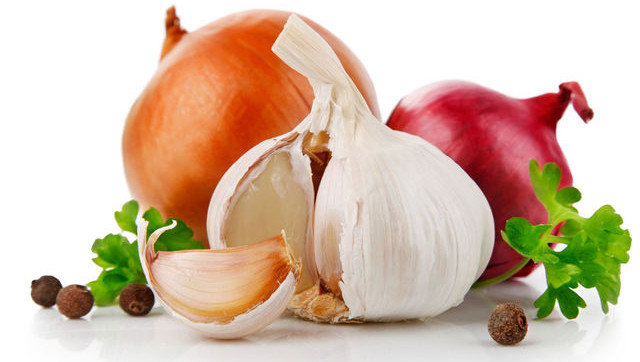
The cause of this bad breath comes from sulfur compounds found in garlic and onions.
According to Todayifoundout, there are several reasons for this bad breath, but it primarily stems from the sulfur compounds found in garlic and onions. Moreover, garlic promotes the growth of odor-causing bacteria in your mouth, exacerbating the issue.
You may notice that even after brushing your teeth, rinsing with mouthwash, and trying various odor-masking methods, your mouth may still have a lingering smell (to some extent) due to eating garlic or onions. This is because some sulfur compounds have been metabolized and absorbed into your bloodstream.
The main culprit of this process is identified as Allyl Methyl Sulfide, which is absorbed directly into the bloodstream during digestion. After entering the bloodstream, it will eventually be expelled through sweat glands and exhaled through the lungs. Therefore, when you exhale, others will perceive your breath as having a strong odor because it contains Allyl Methyl Sulfide. This explains why, even after cleaning your mouth, your breath still carries the pungent scent of garlic.
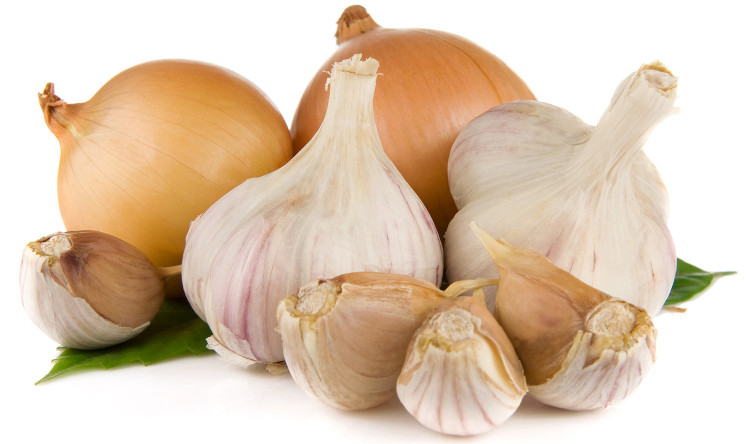
Allyl Methyl Sulfide is also released from the body through sweat glands.
As mentioned, in addition to being exhaled into the air, Allyl Methyl Sulfide is also released from the body through sweat glands. Consequently, not only does your breath smell, but your body may also carry a strong odor after consuming garlic. This effect only ceases once your body has expelled all sulfur compounds. This process can take several hours or even a full day.
Since the sulfur compounds have been absorbed into the bloodstream, there is no effective method to immediately eliminate the unpleasant smell after eating garlic, except to mask it with a stronger scent. Many people often prepare dishes with garlic using parsley, as this significantly reduces the odor of garlic. Additionally, you can drink hot peppermint tea or milk after eating garlic, which will help reduce the bad breath considerably.
How to Reduce Bad Breath After Eating Raw Onions or Garlic
Drink Green Tea
Drinking a cup of hot green tea after a meal can temporarily reduce bad breath until you can brush your teeth.
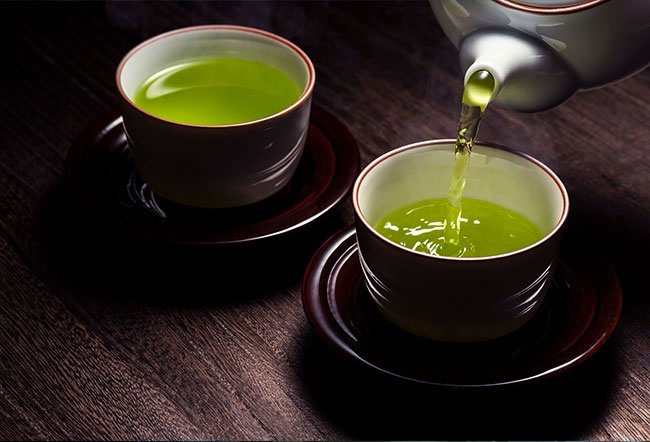
Green tea and toothpaste are more effective than parsley oil, chewing gum, and mint.
In a study, 15 participants used green tea catechin mouthwash and found it comparable to antiseptic mouthwash in its antiplaque effectiveness. In another in vitro study, green tea and toothpaste were found to be more effective than parsley oil, chewing gum, and mint.
Drink green tea with honey several times a day. Green tea is rich in polyphenols, which are powerful antioxidants that can neutralize the sulfur compounds found in raw onions.
Lemon Counteracts Raw Onion Breath
Rinse your mouth with lemon water two to three times a day. A tablespoon of lemon juice in a glass of water can help neutralize the breath from onions. The citric acid in lemons has antibacterial properties that can kill the bacteria causing bad breath.
Just be careful not to let citric acid linger on your teeth. Its high acidity can contribute to enamel erosion and tooth decay.
Drink Diluted Apple Cider Vinegar
Apple cider vinegar contains pectin that supports the growth of good bacteria. Drinking 1 to 2 tablespoons of apple cider vinegar in a glass of water before eating garlic or onions can help expel their byproducts from your system faster, neutralizing onion breath, and killing the bacteria causing bad breath in your mouth. It also aids digestion.
You can drink a very diluted solution after your meal. Alternatively, rinse for 10 to 15 seconds after eating as a mouthwash.
Eat Fresh Produce Like Apples, Spinach, or Mint
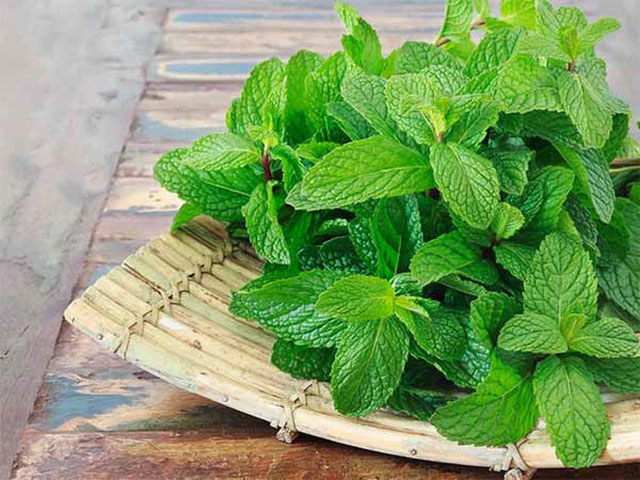
Chewing a few fresh mint leaves after eating garlic can reduce bad breath.
If you have a particularly garlicky meal, consider having an apple for dessert or chewing fresh mint leaves. A study showed that the chemical composition of apples, lettuce, or fresh or cooked mint helps neutralize breath after eating onions.
Apples are one of the most versatile fruits on the planet. They are delicious and have countless uses and benefits. One of these benefits is quickly combating onion breath.
Eating apples is one of the most effective methods for eliminating onion breath. This is because the natural enzymes in apples break down the sulfur compounds in onions.
Brush and Floss After Eating
Most odor-causing bacteria tend to reside below the gum line and in plaque that accumulates on teeth. Brushing and flossing after eating onions or garlic can help eliminate the odor-causing bacteria, along with food debris. Using an electric toothbrush can help you brush below the gum line and reduce plaque. This keeps your breath fresher for a longer time. It is also helpful to gently brush your palate and tongue, especially later on.
Using Mouthwash Containing Chlorine Dioxide
There is some scientific evidence that mouthwash containing chlorine dioxide is effective against bad breath. Chlorine dioxide can help eliminate plaque, bacteria on the tongue, and food particles. This is a similar ingredient used to purify and improve the taste of outdoor water when camping.
You can rinse your mouth with baking soda: Rinse with baking soda solution. This method neutralizes the smell of onions, maintains the pH of saliva, and controls bacterial growth in the mouth.
Drink Some Milk
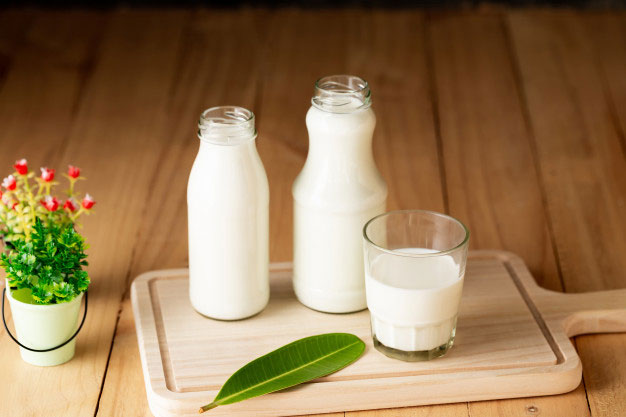
When you drink milk, the sulfur in onions is neutralized by the fat content in the milk.
This is a little-known tip that can help you quickly eliminate onion breath. Certain compounds in milk—especially whole milk—can break down bacteria and odor-causing compounds. When you drink milk, the sulfur in onions is neutralized by the fat content in the milk. Milk also acts as a natural mouthwash. If you have some whole milk at home, pour yourself a glass after a particularly pungent meal, and you won’t have to feel embarrassed about your bad breath!
Use Essential Oils
Essential oils are often added to alcohol-containing mouthwash. In addition to freshening breath, some have antibacterial properties. You can also make your own homemade mouthwash with essential oils and carrier oils (such as coconut oil, almond oil, or olive oil). Essential oils that have proven benefits for eliminating bad breath include:
- Peppermint
- Spearmint
- Myrrh
- Eucalyptol
Swish 1 teaspoon of carrier oil with a drop of peppermint oil to help remove food particles, bacteria, and bad odors. Purchase food-grade peppermint oil at your local grocery store or online. Be sure to watch out for added sugars.
Try a Tongue Cleaner
Bacteria also thrive on the back of the tongue, the area that your toothbrush cannot reach. A white tongue can indicate dead cells, tiny food particles, and bacteria. Tongue cleaning tools such as tongue brushes and scrapers can help you access the back of your tongue. They are also effective in removing odor-causing residue.
To use a tongue scraper, start from the back of your tongue and gently scrape forward. This action will bring the white residue to the front of your mouth. Continue rinsing and repeat this process until no residue is visible on the scraper.
Chew Mint Gum
If you’re looking for a fresh minty breath, you need peppermint. Peppermint contains chlorophyll, which helps freshen breath while masking the smell of onions. It also has mild antiseptic properties that help combat bad breath caused by bacteria.
You can find peppermint-flavored gum and mints wherever you go. Just make sure you buy sugar-free varieties, as sugar in gum can harm your teeth. Chewing peppermint gum can temporarily neutralize garlic breath. It can also reduce acid reflux, which may lessen the lingering effects of onion and garlic after digestion.
You can also grab some fresh mint. Drinking mint with water or chewing mint leaves can cut through the bad breath after eating onions.




















































